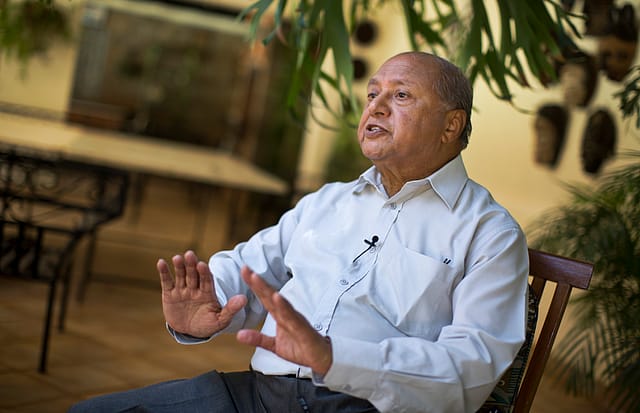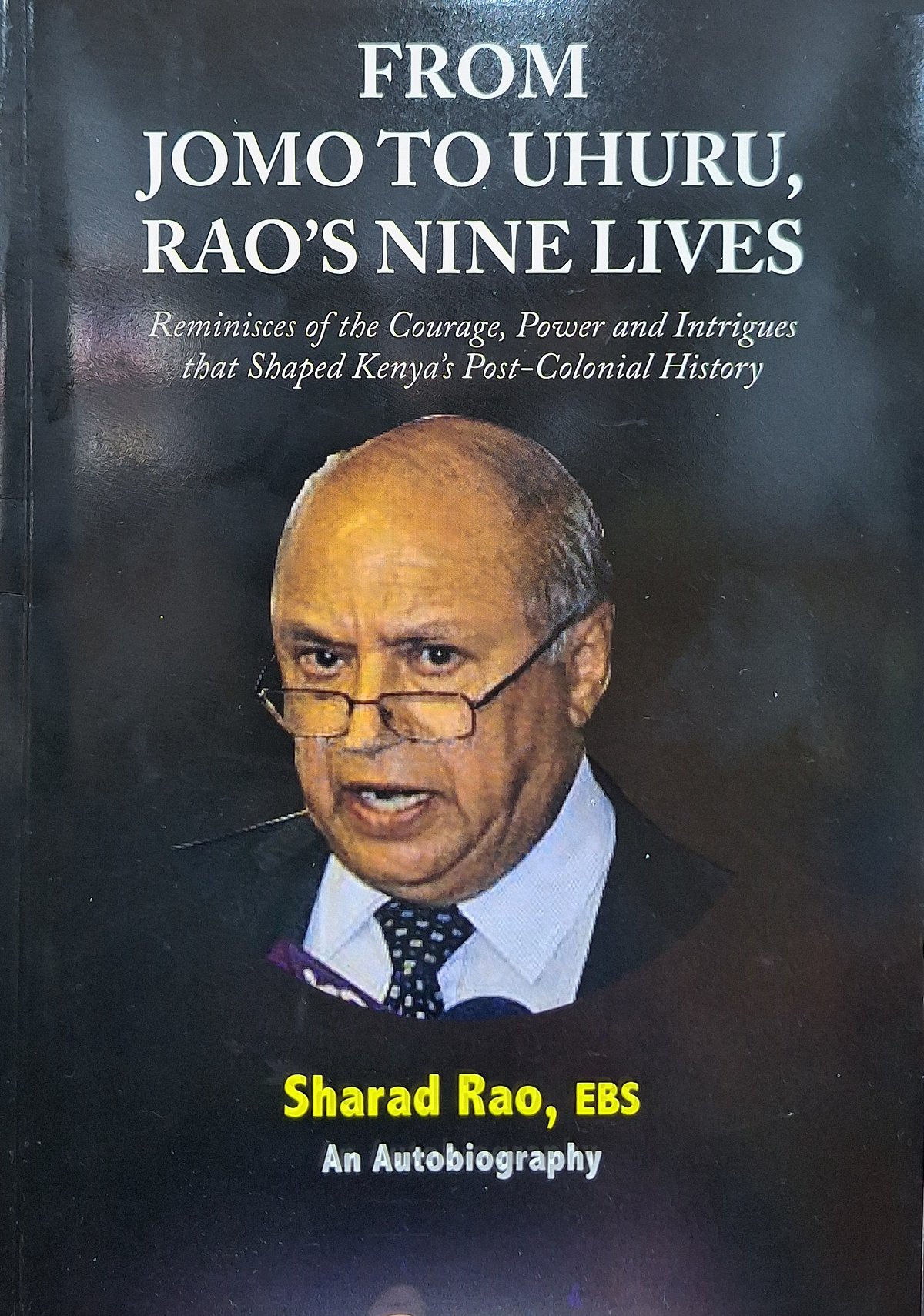A True Pioneer

Sharad Rao—who served under four mercurial presidents, and as director of public prosecutions, and held the most senior status of any Asian in the Kenyan civil service—was born in 1935 in Kenya and brought up in the British colony “where skin colour and identity were determining factors” in all aspects of life. His father, an accountant, had arrived with a British Indian passport in 1931 in Nairobi that was racially segregated and the whites “displayed considerable hostility” towards Indians.
The early pages of the book dealing with the migration of Indians to Africa under British supervision to work in the railways and then as shopkeepers, then as doctors and subordinate civil servants like clerks and post office workers even as African land was appropriated by colonisers from Europe, is a history of classic European colonisation. And Nairobi at this period is described thus, “the prime districts [were] for Europeans...the Asians lived mostly in the Indian Bazar…houses so close together that they neutralized the natural advantages of air and light...the Africans were not allowed to live in the town [but] in squatter areas.”
Rao’s family was in severe financial distress; when he was less than ten he “had no money at all,” and he had to leave school education after the O level. He worked at Shell for three years before admission to Lincoln’s Inn, qualifying as a barrister in 1959 and returning to Kenya and starting his own practice in 1960. He writes, “as a criminal lawyer I hardly ever lost a case” and cites many examples.
The involvement of Indian Kenyans, including Rao himself, with the African national movement is described. Nearly half the freedom fighters were killed and many jailed, including the leader Kenyatta himself though his involvement with the violent Mau Mau was never proven. Before and after independence in 1963, although racial discrimination still prevailed in the courts, Rao defended many nationalists free of charge.
Openomics 2026: Continuity and Conviction
06 Feb 2026 - Vol 04 | Issue 57
The performance state at its peak
Rao notes Kenyatta’s authoritarian tendencies as Kenya’s first president, with rife corruption, nepotism, and benefits for the Kikuyu tribe. Kenyatta worried about Indian domination of trade, even by Kenyan citizens, leading to detentions, deportation, bribery and victimisation, causing great anxiety. Land reclaimed from the white settlers ended in the hands of regime nominees. These adversities led to the Indian community being reduced to 78,000 from 180,000. Indian applications for citizenship were delayed, and Rao obtained his only in 1968.
From 1970, Rao worked in the State law office for 14 years, initially as assistant director of public prosecutions. He prosecuted the first treason trial in that country, and met Charles Njonjo, the then attorney general. Both Kenyatta and Njonjo had a “strong preference for more British officers especially in the judiciary.” Before Kenyatta died, a prosecution case by Rao was launched for foreign exchange violation against Kapila, a well-known Indian lawyer, who thanks to Rao, received a light sentence. This favour was returned by Kapila with untold malice, typical of the lack of support Rao received from fellow Kenya Indians. He writes, “the opposition I faced was more often instigated by my own community.”
Rao found it hard when he heard the president abuse the Indian community. Rao frequently mentions African sentiment against resident Indians, and gives many personal anecdotes of ministerial bias, anti-Indian official media, and protocol discourtesies against official Indian visitors, though he also points out the flaws in the Africanisation policy and adds that the inter-race atmosphere had changed for the better by 2016.
Rao describes meetings with Idi Amin, later dictator of Uganda, when Rao was assisting in a court martial against an alleged opponent of President Obote. Rao did not then find Amin anti-Indian, but notes that Kenyan Vice President Moi, who later became president, did not allow the Uganda Indians even a temporary stay in Kenya. Later, in 1976, Rao was an eyewitness to the Kenya-Israel discussions on planning the Entebbe raid by Israel to rescue its hostages in Uganda, a meeting that included later Israeli premier Ehud Barak. Kenyatta was not informed to preserve his innocence if the raid went wrong.
In 1974, as head of Kenya’s Badminton Association, Rao visited China and met Chairman Mao and acting chairman Hua Guofeng. Rao describes China at various epochs and in 1981 when he went again, he records how the Chinese reciprocate displeasure at perceived slights, and adds, “The Chinese did not then or now admit that they are at fault.” Rao revisited Beijing for the Olympics in 2008 and compared it with 1974 as “day and night”. Among his legal activities, Rao records his experiences in sports administration in cricket, tennis, the Commonwealth Games and Olympics.
When Kenyatta died in 1978, Vice President Arap Moi took the presidency (1978-02) and after an alleged coup by Minister of Justice Njonjo in 1982, “began to crush all dissent and concentrate power.” Rao, always close to Njonjo, was moved to head the Business Premises Rent Tribunal and then nominated to the Iran-US Claims Tribunal in Netherlands from 1984-9, where his even-handedness resulted in open hostility from the Americans. From 1989-96 the Rao family fended for itself, but when he returned to private practice in Kenya was offered the directorship of public prosecutions, though it was opposed again for racial reasons. The election of 2007 sparked violence and a new constitution was promulgated, which led in 2011 to Rao heading a vetting process, assisted mainly by the eminent Judge Albie Sachs, of all judges, and magistrates to create a robust and trusted judiciary.
Rao expresses the hope that his book will be “informative and engaging”. It is both. The title derives from a headline in the Kenya Daily Nation in March 2016. Chronology is sometimes not followed, and there is the want of an Index, but the memoir is candid in showing the prejudices of the Indian and British communities, and African politicians—with exceptions, of course. He uses self-deprecatory humour when describing his marriage in 1964, when his wife Leena, sister of Girish Karnad, “felt she had stepped back 100 years when she arrived in Nairobi,” because, whereas the Europeans threw off their social shackles in Africa, Indians brought their social systems with them.
It is rare to see a memoir of an Indian-origin person who succeeded as a professional in Africa, and that is what gives this book special merit.

